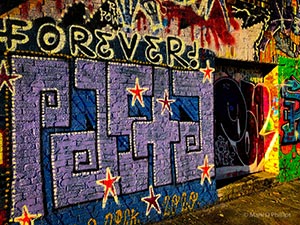
World Cup soccer was designed as a celebration of global unity and diversity through sport, but not in 2022.
Now, it’s being held in an authoritarian Arab nation where being gay, transgender or bisexual is a crime punishable by hard time in prison. Women are routinely oppressed and abused, migrant workers are forced to work in brutal and even deadly conditions. And, two days before competition started, beer sales were banned in stadiums, leaving Budweiser stuck with millions of dollars-worth of brewskis it can’t sell and contemplating a lawsuit against soccer’s governing body – FIFA – whose head honcho cluelessly delivered a bizarre, nearly hourlong speech defending the backward country.
Meanwhile, athletes were threatened with penalties if they dared to wear armbands showing solidarity with LBGTQ+ people.
Celebs are divided, with some abandoning planned performances. For others, it’s business as usual.
All this raises the question: What is the United States team doing in Qatar?
It’s incredibly hypocritical that, as much of the world condemns Russia’s attacks on Ukraine, those same countries’ teams are playing soccer with gusto in Qatar, the first nation in the Arab world to host a World Cup. The stage was set Nov. 19, the day before competition started, when FIFA’s president, Gianni Infantino, attacked Western critics of Qatar, companies that do business there, human rights groups and news media organizations that have defended the cause of migrant workers.
“You want to criticize someone, come to me,” Infantino said, weirdly, at a news conference. “Criticize me. Here I am. Crucify me,” he added, rising in his seat and extending his arms out wide. “Don’t criticize Qatar. … Because I’m responsible for everything.”
There’s a good deal of evidence that Qatar, not the soccer chief, is running things. Human rights groups charge that in the decade leading to the World Cup, thousands of migrant workers hired from the world’s poorest corners have died – victims of extreme heat and harsh conditions. (Qatar disputes the numbers, and insists conditions have improved).
“Today I feel Qatari. I feel Arab. I feel African. I feel gay. I feel disabled. I feel a migrant worker,” Infantino also said at the news conference.
Oscar-winning American actor Morgan Freeman made a surprise appearance in Qatar, narrating the opening ceremony. “We gather here as one big tribe,” Freeman said.
Former British soccer star David Beckham is a paid “ambassador” for Qatar 2022. He watched the opening ceremony and first match from the stands.
American musical group Black Eyed Peas and Colombian singer Shakira are among the artists to perform. But British music icons Dua Lipa and Rod Stewart are two performers who’ve vowed to boycott the event, which runs through Dec.18. Despite the controversy, the games went on.
Shouting matches have erupted outside the World Cup security checkpoint between fans screaming “Women, Life, Freedom” and others shouting back “The Islamic Republic” as the crisis in Iran spills into the soccer stadium. Fans yelling about “freedom” are upset about the Sept. 16 death in the custody of Iran’s morality police of 22-year-old Mahsa Amini, who was arrested for not wearing her hijab, or headscarf, in accordance with government standards.
The Law Enforcement Command of Islamic Republic of Iran stated that before transferring Amini to a hospital, she had a heart attack at a police station, collapsed, fell into a coma, then died. But eyewitnesses, including women who were detained with Amini, reportedly said she was severely beaten, and that she died as a result of police brutality. Amini’s passing spurred widespread pro- and anti-government protests. According to Human Rights Watch, at least 304 anti-Iran demonstrators have been killed by Iranian security forces.
Qatar’s reaction? Security guards have confiscated flags emblazoned with the words“woman, life, freedom” in apparent support of the Iranian regime, and a spokesperson for the organizing committee said FIFA rules prohibited the display of items with “political, offensive, or discriminatory messages.”
Me? I refuse to watch World Cup on TV. I will not support Qatar.
By Andrea Peyser





